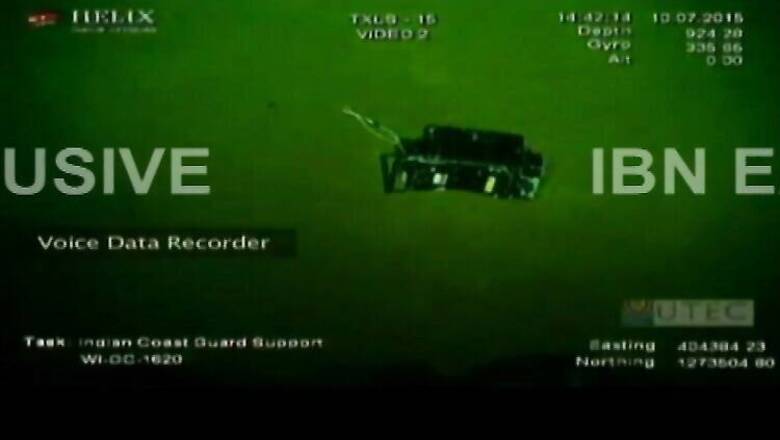
views
It was an unrelenting efforts for 693 hours of surface and 196 hours of air efforts that led to the recovery of the human remains and wreckage of the Coast Guard Dornier aircraft, which went missing 36 days ago.
The unprecedented search operation was carried out by the Indian Coast Guard, Navy, other government agencies and Reliance Industries Limited. The remains were recovered from the seabed at the depth of 990 metres.
ICG Dornier CG-791 was airborne from Chennai International Airport for routine night surveillance on June 8, 2015, and was scheduled to return to base at 2200 hrs. The last known position of aircraft by Trichy Radar was 32 miles North-East of Karaikal. At 2124 hrs, the International Maritime Satellite (INMARSAT) terminal onboard also suddenly powered off. Promptly the Regional Headquarters (East), launched a massive Search And Rescue (SAR) operation code named Operation TALASH to locate the overdue aircraft.
Simultaneously, four ships and a long range maritime surveillance aircraft, P8I, of the IN were also deployed for the operation. The Subsidiary Intelligence Bureau was also requested to activate the community information mechanism to sensitize local populace. The fishermen were also apprised about the incident so that they could report sighting of any debris at sea. Initially, the Surface Search was undertaken based on information shared by Trichy radar. Subsequently, the initial position of the search was revised upto 70 nm seawards and the air search area was extended upto 180 nm based on inputs from Chennai ATC Radar and powering off of the INMARSAT.
Leaving no stone unturned to accomplish the mission, the Indian National Centre for Ocean Information Services (INCOIS), Hyderabad was requested for running their SAR model to determine the most probable area. The National Remote Sensing Agency (NRSA), Hyderabad was also requested for providing Satellite imagery of the most probable area for locating debris.
A ray of hope emerged on 12 Jun 15, with the sighting of a thin oil sheen but proved to be short lived as the sample was found to be devoid of any oil derivatives. Thereafter a request was forwarded on 12 Jun 15 to the IN and National Institute of Ocean Technology (NIOT), for underwater search. A Black Box detector from NIOT was fitted onboard Coast Guard Ship Vigraha. Indian Naval Survey Ship, INS Sandhayak arrived in area AM 12 June.
The major challenge in the conduct of the under water search was that the seabed in the search area had a steep gradient. Though the IN ship reported receipt of 06 pings (sub-surface transmission) on 37.5 KHz frequency, however as no subsequent transmission were received, firm position could not be localized. Thereafter on 13 Jun 15, IN submarine Sindhudhwaj commenced search in the area of 15x15 Sq NM. The submarine reported sporadic sub-surface reception but as the signal was weak, the position could not be established once again.
NIOT Research Vessel (RV) Sagar Nidhi was also engaged for the seabed profiling but no aircraft debris was located. With no definite lead, assistance was sought from M/s Reliance India Limited for services of Multi Support Vessel (MSV) Olympic Canyon equipped with Remotely Operated Underwater Vessel (ROV) High Precision Acoustic Positioning Equipment (HIPAP) for undertaking sub-surface search, extended the support ‘on GRATIS basis’. The vessel commenced the search in an area identified by ICG, spanning over 500 x 500 m area, utilizing underwater camera fitted on ROV. However, as no positive results were achieved the vessel departed area for contractual commitments on 23 Jun 15.
INS Sindhudwaj, redeployed by the Indian Navy on 06 Jul 15, picked up a barrage of transmissions at a depth of 990 metres from the (SLB) Sonar Locator Beacon of the missing aircraft. This proved to be the precise thread to approach the elusive source. M/s Reliance, upon request, redeployed the MSV on 10 Jul and commenced search in positions identified by the submarine. The break through was made by MSV Olympic Canyon on the morning of 10 Jul 15.
33 days after the ICG aircraft went missing ,the human remains and wreckage of the aircraft was found at depths of 990 meters in position 17 Nautical miles S/E of Cuddolore. The debris which included the flight data recorder, Two Engines, Propellers, Tail and tail cone, air frame parts, Maevest, the Single Line Replacement unit, parts of the fuselage, part of the landing gear and the Cockpit Voice Recorder, part of the flying overall, watch and boot worn by the crew have been recovered by the Reliance Vessel Olympic canyon vessel.
The operation mounted for the missing CG 791 with participation of large number of national agencies is unprecedented in the maritime SAR history of India. Apart from ICG, the IN, IAF, NIOT, INCOIS, NRSA, Naval Physical Oceanographical Laboratory, Naval Operations Data Processing & Analysis Center, the Airport Authority Of India Limited, Coastal Security Group Tamil Nadu, Reliance Industries Limited & Omkar foundation have contributed to the undersea SAR mission. However, the role played by the IN submarine in locating the wreckage and more importantly by MSV Olympic Canyon in undertaking the mammoth task of salvage in rough sea conditions is very noteworthy.



















Comments
0 comment